Homeschool workbooks have been our favourite way to formally educate the children, right from kindergarten to high school. That’s my favourite way and the kids’ favourite way. Workbooks allow mom to be a little bit hands-off sometimes, the heavy work is done already and we moms may just be able to cook lunch while the kids get stuck in. Workbooks can cover just about any topic, they’re cheap, light, easy to travel with, and can do multiple duty in kicking educational goals. While your child is filling in his science workbook he’s practicing writing, spelling, and English grammar too. Homeschooling workbooks we have loved for many subjects, years, and age groups, are listed below.
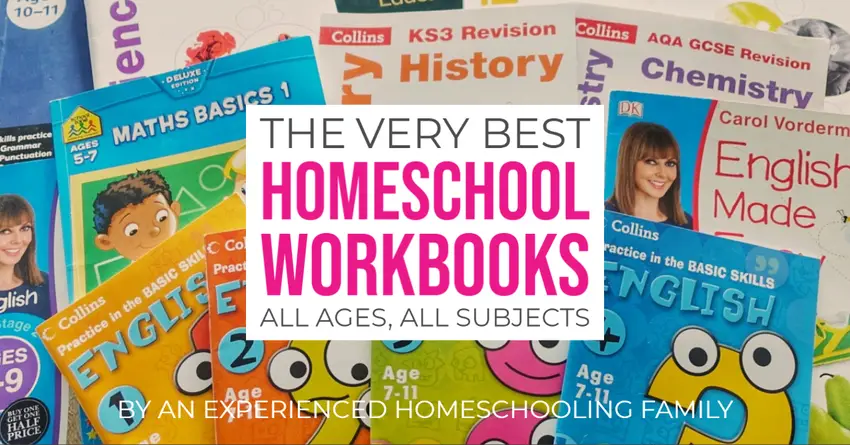
We include workbooks below for any age child. My kids are teens now, we’ve been through junior school, middle school and high school, KS1, KS2 and KS3 already. You can find useful workbooks for any age or grade. The links on this page should work for the United States, UK, Australia, or anywhere else, but as needed I’ve added special links for particular countries.
Most of the workbooks for homeschooling are cheap, under $5 US or so. For older kids the books become thicker and more expensive.
Obviously, the workbooks are just one of the resources we use, but they are the most school-at-home of our homeschooling artifacts.
If you check out our posts on homeschool resources you’ll see that toys, games, the kitchen, the garden, movies, TV, YouTube, online learning series, and the real world actually make up the bulk of the gear we use in educating our kids outside classrooms.
Sometimes we even use online tutors. We strongly believe that school is the worst place to get an education.
Table of Contents
Using Homeschool Workbooks
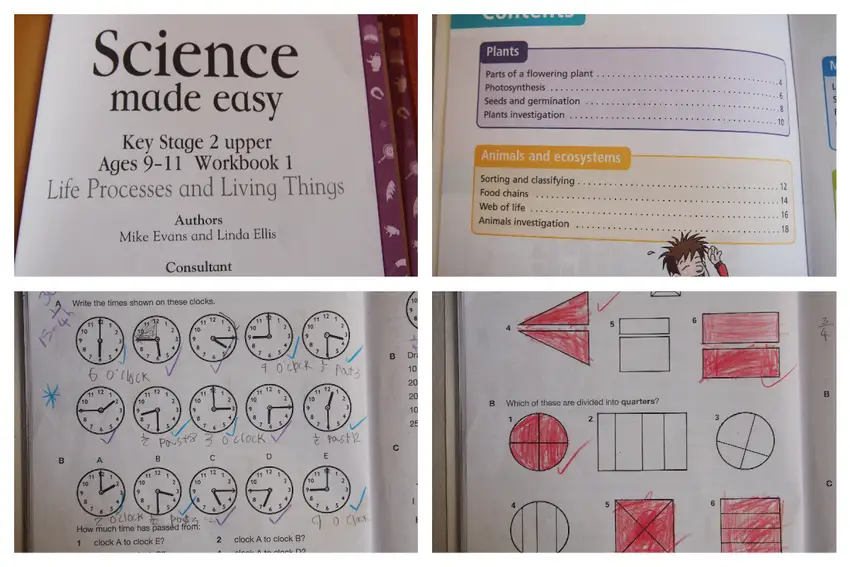
We’ve tried to find homeschooling workbooks that are available in, and suitable for the UK, USA and Australia.
Where we’ve managed to find an Australian equivalent you may find a separate link.
I’ve managed to order a lot of British school curriculum workbooks from Amazon Australia, but it’s not as easy as finding them in the United States.
If I can’t find British, I’ll substitute Australian or US freely, it’s good for the kids to be aware of alternate spellings and idioms, I think.
We all communicate online with people from around the world every day, we need to be aware of differences.
Advantages of Using Workbooks for Homeschooling
- Flexibility – choose the workbook to suit the child
- Removes lesson planning
- No printing worksheets
- Can keep homeschooled kids occupied
- Can be easy, fun or challenging
- A great rainy day activity
- Suitable for any age or grade level
- Can be used to prepare for sitting exams.
- It’s easy to set goals and schedules
Tips for Using Workbooks
One of the great positives of homeschooling is its flexibility and our ability to tailor learning to the child and his interests.
If you want to employ workbooks don’t make the same new homeschooler mistakes I made.
Don’t force, don’t push, don’t expect hours of dutiful work. Follow signs, signals, enthusiasm and interest levels closely.
- Tell your child how many pages they must complete. If he knows he has 2 pages to do, it’s less daunting than being faced with a whole book.
- Wherever possible sit with your child while they work, keep it light, make it fun
- Pour on praise, always.
- If you don’t want to store the completed workbook, photograph the completed pages in case ever required to show proof of past work.
- Have quite a selection at home, that way, if you find your child dislikes one or enjoys another type, or just isn’t in the mood for the usual – you can give them choice and make them feel more in control of their learning and their days.
Where to Buy Homeschool Workbooks?
If the links on this page don’t work for you, if the item is out of stock or no longer available, we can suggest a few other places to buy homeschool workbooks online.
This page should cater to a global audience, the UK, USA, and Europe should be fine. Australia, take a look at the next paragraph.
Amazon is the obvious first place to look, that’s where we buy all our workbooks, avoiding big stores like Waterstones.
Sometimes we use Book Depository, they do deliver to Australia and world-wide, no delivery charge, but we think they’re expensive. In 2023 Book Deposity announced its closure, so Amazon it is.
Also try Fishpond, an Australian online book store.
Some printing houses have their own online stores, but, Amazon is easiest and often cheapest globally. Our links below go to Amazon US, UK, Australia and Europe, mostly. Amazon is also available in Malaysia, Singapore and so on.
Homeschool Math Workbooks
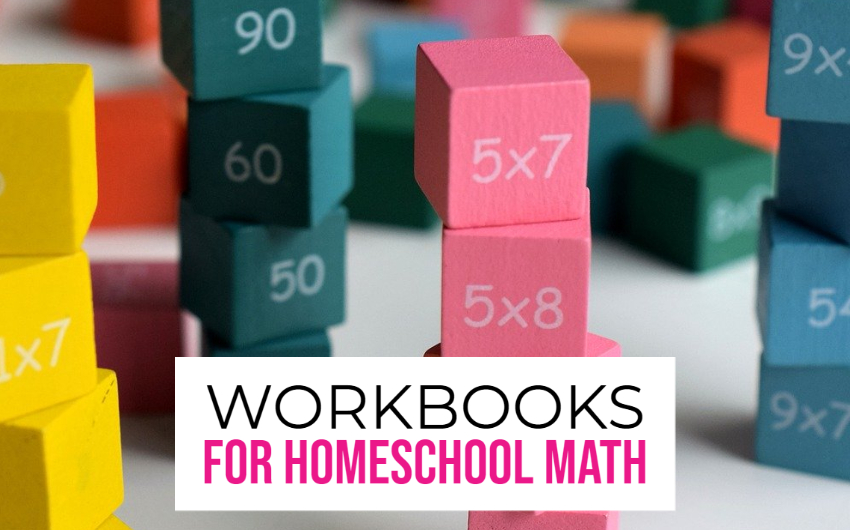
Times Tables Practice
Lots and lots of practice in this multiplication and division math workbook for 3rd, 4th and 5th Grade kids.
Basic math and arithmetic is universal so a workbook from any country is fine for basic math skills. You may see differences for the methods (the “workings”) you need to show to pass exams as kids get older, for this you’ll need to refer to your country or state or exam board curriculum. This should be available online.
There are subtle differences between British and American maths, for instance people from the UK (and Australia) say one hundred and one for 101, Americans say one hundred one. But maths is maths, particularly for younger kids.
Alternatively, you can buy maths curriculum specific to a country or exam board for older kids, these tend towards very expensive. For intance this is the revision notes book my children used for iGCSE maths, where the i stands for international, but the education and curriculum are British.
General Maths Workbooks By Grade
Most workbooks come in grades levels, so here you can find grade 3, here grade 4, here grade 5 etc.
Telling the Time Workbooks
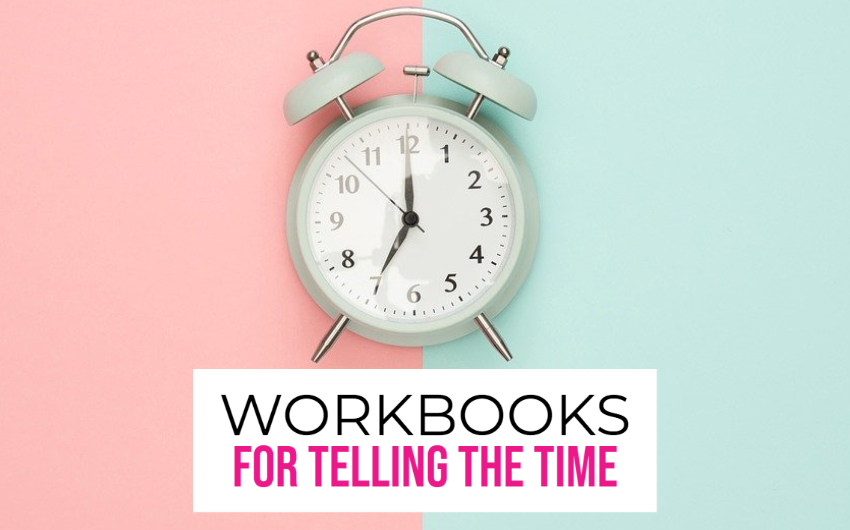
Younger children, from about 4 years old can start with the basics of telling the time, hours and half hours.
You’ll find whole books dedicated to just this.
As your children get older add quarter hours, minutes to and past plus the 24 hour clock and digital time. You’ll probably need more than one workbook to cover time-telling fully.
Don’t sweat this one too much. I taught my son how to tell the time over and over again and it never “stuck”.
He’s a teen now and he can, indeed, tell the time. Don’t worry, they come good.
School Zone Time, Money and Fractions age 6 to 8, 1st to 2nd Grade Maths. We used this book and recommend this series.
Advanced Time Telling. Grades 3,4,5, and 6. Elementary Students. This book covers more advanced time telling including time zones, time conversions, train time table calculations and so on.
If you’re about to start practicing telling the time and explaining clocks to your preschooler or school-aged child, a nice, wooden clock face with moveable hands is going to be very useful in your homeschool room.
Try to make a game out of using it. Keep it fun. We love this one, because it starts life as a toy and works from 36 months to 6-year-olds.
Learning Roman Numerals
In the UK kids learn Roman Numerals. I’m not sure if school kids do in Australia or the USA, but I do know that my son’s iGCSE English teacher didn’t know them, which was a bit embarrassing for her.
Do your kids a favour and decode Roman Numerals together. It’s fun, it’s like a secret code, and can be a great addition to a unit study or project on Ancient Rome and the Romans.
It could even be part of learning Latin if you’re taking the classical path. I did Latin in school, I’m British.
A couple of resources or workbooks for learning Roman Numerals below. Practice sheets and repetition are gold with things like this.
Practicing Roman Numerals is for younger kids, Fun With Roman Numerals is probably the introduction to Roman Numerals that I would pick for my kids.
Learning Roman numerals is really easy, you can cover it in half a day but the child needs basic maths or numeracy skills first, of cource.
Homeschool Science Workbooks

This is the series of science workbooks we used when our boys were younger and we liked them a lot, we bought every book in the series and used them all except Kindi.
Science is my subject. As a science graduate and professional scientist, I found them really good for young scientists.
The diagrams and graphics are great.
If you want more ideas on homeschooling science, see our post on kitchen science, experiments and demonstrations from your own kitchen.
There are lots of science based activities you can learn from at home with the items currently on your shelves.
Our fun science resources and games are here.
- Kindergarten
- 1st grade
- 2nd grade
- 3rd grade
- 4th grade
- 5th grade
It’s great to buy a few scientific props or toys to go with these workbooks. You’ll notice the 2nd grade workbook features magnetism, so buy a simple magnet set like this for play and demonstration or the core principles. We used a magnet set similar to this, it was a great STEM activity, and fun.
Homeschool English Language Workbooks
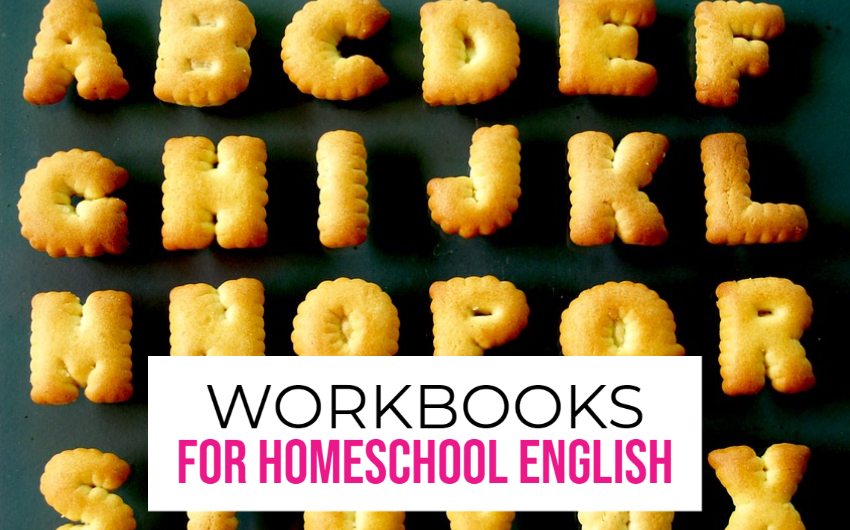
Sight Words
This sight words practice workbook would be perfect if you’re following a typical school- style reading program where the lists of sight words have to be memorised before phonics come in.
I have to admit – we didn’t do sight words, my boys learned to read without them, but I know plenty of people do use them, so here it is.
Cursive Practice
This cursive practice workbook is for those of you who still allow your kids to learn joined-up writing.
Do you know some schools don’t teach it anymore?
For me that’s unthinkable so yes, absolutely my boys can write in cursive. We started out using work books like these.
English Comprehension
English Comprehension workbooks are another box to be ticked. Try these examples below.
General English Workbooks
These School Zone workbooks were favourites of ours, we completed many of these, mostly around Grammar, spelling, comprehension and other language skills.
I still have some here today, some of the very few we kept.
You can see this School Zone Reading Activities workbook here.
Geography Workbooks
We didn’t use these, they weren’t available as far as I know when my boys were younger but I’m so excited to see these Geography workbooks on sale in my favourite series.
They also come in multiple grade levels, from Pre-K up. More homeschool geography resources are here.
Random Workbooks
Anger Management Workbook
Who knew anger management workbooks were a thing? Take a look here.
Thriving With ADHD Workbook
This ADHD workbook could be useful for your ADD, AuADHD, or ADHD child in a homeschool setting.
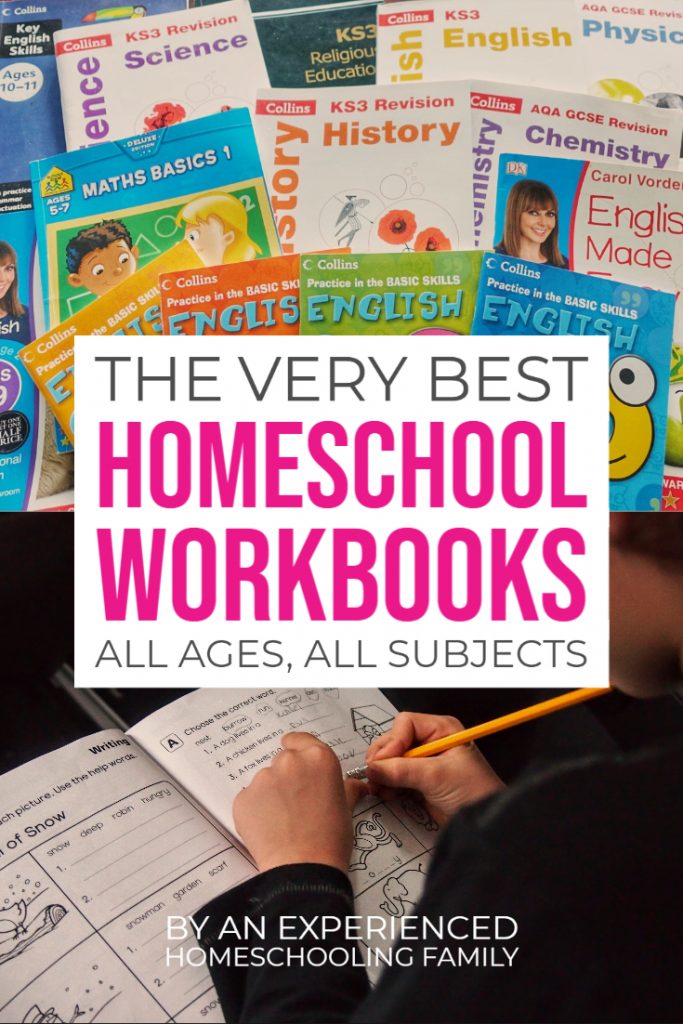
Conclusion on Workbooks for Homeschooling
We’ve loved our workbooks over the years. I still have many in the house for my teens but as homeschooled kids get older good ones do become harder to find. Take a look at some of the books above. Would they suit your child? Don’t forget, keep your homeschooling fun, stay happy and stay interested. Once the interest has evaporated for the day, maybe look into some project based unschooling instead.
Apichaya Vatthanakulkachon says
Hi, my family just moved back from USA,We do the homeschool for our kids, 6 and 9 grade for couple years there .After we decided to move to Thailand,we bought pretty much homeschool text and work books along since we thought we will continue homeschooling them.But we find a right school for them and don’t need those books any more.So we just would like to know if anybody here will be interested to buy books from our family.